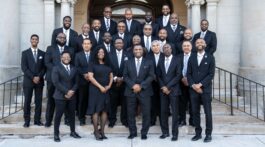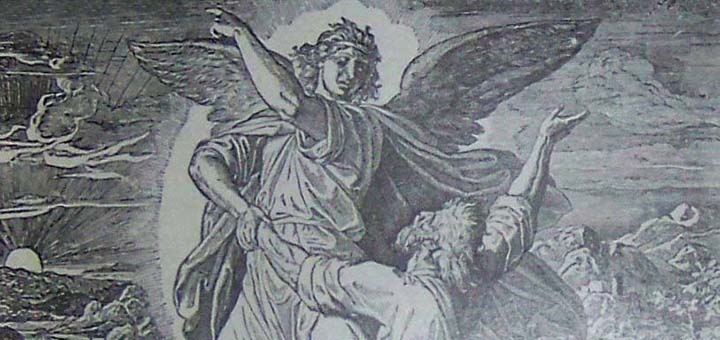We call it “the time of trouble.” As we saw in the book of Job, God allowed Satan to visit terrible suffering on Job because Satan accused God of bribing Job. When Job suffered his horrific tribulation, his wife told him to “curse God and die.” Job refused, and though he cursed the day of his own birth, he remained steadfast in his trust of God.
When Pharaoh refused to let God’s people go and worship him, God visited plagues on them in the form of the gods they worshiped. In the time of trouble, those who refuse to trust in God will be visited with the consequences of their self-focus. Remember that Job, when tested, refused to blame God and take his own life; the wicked, when tested, will blame God and try to take the lives of God’s people.
Just as Calvary was the ultimate showdown between Christ and Satan personally, the Time of Trouble is the ultimate showdown between the church — the followers of Jesus — and the world, the followers of Satan. On the cross, Jesus demonstrated that he was willing to die in order to save humanity, and Satan demonstrated that he was willing to kill the sinless Son of God in a futile attempt to save himself. In the time of trouble, the followers of Christ demonstrate that they would rather die than knowingly commit a wrong act; the followers of Satan will demonstrate that they are willing to do anything to avoid suffering themselves — and all in vain at that, for their suffering will be intense. The question of whose way is right, that of Christ or that of Satan, will be settled in the most public of ways, for all to see.
It is important to note, however, the words which I paraphrased from Ellen White, “rather die than knowingly commit a wrong act.” Because this is quite a different thing from being “without sin.” We spend a lot of time talking about justification and sanctification, but we forget there is a third component, or stage in the process. The best summary I know is this: justification deals with the guilt of sin; sanctification deals with the power of sin; but glorification — which occurs at the Second Coming — deals with the presence of sin.
When we confess our sin and ask for forgiveness, the Bible tells us we are justified — we are declared “not guilty.” Justification deals with the guilt of sin. Sanctification is the continual transformation of our lives, so that sin no longer has power over us. This, however, is not instantaneous, as justification is. Sanctification “is the work of a lifetime.”
But sin is something like a deadly virus. Even if miracle drugs keep us from dying, even if they eliminate the obvious symptoms, the presence of the virus in our bodies makes us a carrier. That’s what glorification deals with, when we are changed “at the last Trump, in the twinkling of an eye.”
What this means, of course, is that those who go through the time of trouble, still carry the virus of sin within them. They are not sinless. And Ellen white affirms this in Acts of the Apostles.
“None of the apostles or prophets ever claimed to be without sin. Men who have lived nearest to God, men who would sacrifice life itself rather than knowingly commit a wrong act, men whom God had honored with divine light and power, have confessed the sinfulness of their own nature. . . . So will it be with all who behold Christ” (AA 561).
Some have insisted that to be “ready” for the time of trouble, we must comb through our past and be sure to identify every sin we have ever committed, and be sure to confess it. Quotes like the following reinforce that idea.
“If the people of God had unconfessed sins to appear before them while tortured with fear and anguish, they would be overwhelmed” (GC 620).
That does make it sound like having a single unconfessed sin would be fatal in the time of trouble. If that were true, then searching a past for unconfessed sins would be an imperative. As noble as this may sound on the surface, it is mistaken for several reasons. First, it puts our focus on ourselves and our sin, instead of Christ and His salvation. Second, it becomes another type of salvation by works, in this case, the work of identifying every sin and confessing it. Third, it assumes that we are conscious of every sin we commit, and have a perfect memory.
It’s important to note a couple of things about the quotations above. The Greek word most often translated as “sin” in the New Testament is the word hamartia. It literally means “to miss the mark.” There is a great yawning gap between “missing the mark,” and “knowingly committing a wrong act.” This readily explains how it is quite possible to still be a sinner, to still “miss the mark,” while at the same time refusing to “knowingly commit a wrong act.” It is one thing to aim at a target and miss the bull’s-eye; it is quite another thing to aim in some other direction entirely.
Notice also that the second quotation, the one from The Great Controversy, does not say that the people of God will have no unconfessed sins, but that if these sins appeared before them they would be overwhelmed. Perhaps a part of the grace of God for those going through this period will be that he will not allow any of these to come to mind.
I’m not suggesting that any sin which does come to our minds should not be confessed, quite the contrary. I’m suggesting that attempting to recall every action we took in the third grade — in my case, now more than 50 years ago – is not what God wants us to do.
Why should I say such a thing? Because we tend to focus on individual infractions, on sins. But the real problem is Sin, our desire to be God, in our own lives at least, if not in the lives of others. And this problem, the problem of Sin, is the one God is concerned about.
We have in Scripture, in fact for the life of Christ himself, two examples that demonstrate this point. First of all, we have the story Jesus told about the Pharisee and the publican. The Pharisee’s prayer is all about himself, about how superior he is to people like the publican. And we know what he had in mind, because we know what the Pharisees focused on. They focused on what they saw as “sins,” such as how far to travel on the Sabbath day, or, in one famous case, whether or not to eat an egg that a hen laid on the Sabbath day, since it required the hen to “work” to produce the egg. The Pharisee spent so much time focusing on “sins,” that he missed the bigger problem of pride. Legalism, focusing on small infractions, and pride go together.
By contrast, the publican does not mention anything specific at all: not his knowledge or lack of it, nothing to do with the law at all. All he does is acknowledge his status as a sinner, and ask God for mercy. And Jesus explicitly says that the publican, who did not mention any specific sin, nevertheless was the one justified.
The other example is the thief on the cross. Once again, we find no mention of specific sins. All the thief on the cross does is confess that he and his fellow thief deserve the punishment they are receiving — in other words, that they are sinners. And once again, all he does is express faith in Jesus and request grace: “Remember me when you come into your kingdom.” He says this in faith, because Jesus is hanging on a cross; no coronation, except with the crown of thorns, appears imminent. And yet the repentant thief sees beyond all that, sees that Christ will come into His kingdom. And he asks to be remembered. Not because he deserves it, for he has declared he deserves punishment. He must’ve asked it because he saw Christ’s love for him.
I have spent some time trying to demonstrate that sinlessness is neither necessary nor possible during the time of trouble. And yet, there is a kind of perfection that will be required. That will be part of our next discussion.










